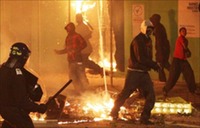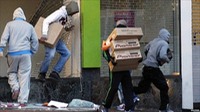Is there a connection between the recent London riots and education? I would like to argue there is.
Recently we witnessed the rather shocking news and images of riots in London in early August of this year. Seemingly sparked off by the accidental death of a young man shot by police officers, the riots escalated for several nights throughout London, but then spread to other major cities such as Birmingham where tragically young men lost their lives.
What is unusual over these riots is that it seems that the main cause of the riots had nothing to do with a principle, ethnicity or social status but appears on the surface to have been motivated by simple greed. People felt that this was a legitimate excuse to simply loot shops and cart out ‘their’ flat screen televisions and brand new microwaves. Some of the looters appeared to be as young as 10 or 11 years old. This is sadly a scene that is not unfamiliar to those of us that lived through the events of May 2000 in Fiji, although thankfully Fiji did not see teenagers accused of arson and even murder as has happened in the UK.
The debate now occurring in the UK is how this could have happened, who is to blame and what can be done about it? It would be less than wise to categorically state any answers to either of these questions, but I do strongly feel that one of the places that can contribute to this not occurring in the future is our educational system. In particular whilst the issues of ‘rights’ in our education sectors has frequently (and correctly) been raised, there is very little, or even an absence of an awareness of the ‘responsibilities’ that we should also carry including our children.
Indeed, I believe that to understand the 2011 London riots, one should really look at the very aptly subtitle of the documentary film Enron: The Smartest Guys in the Room. I say that because it seems as if the Enron scandal (along with the associated bust up of the accounting firm Arthur Anderson) is based on a mindset that appears to have focussed exclusively on ‘rights’ and completely abdicated their ‘responsibilities’. The architects of this immoral behaviour are clearly academically ‘smart’ and ‘bright’ hence the subtitle ‘The Smartest Guys in the Room’. Smart? – yes. Moral, ethical, ‘nice folks’? – no!
If these are the ‘brightest’ folks doing this kind of scandal with the best that our modern education system has to offer, then why are we shocked that people at the poorer end of the socio-economic scale behave in a similar way? In fact the overriding impression that the journalists have noted from over 2,000 people already put through the court systems of the London riots, is that it was apparently racially, educationally and age ‘blind’.
I do not think it is a stretch to suggest that there is something missing from the UK’s education system across the board, and I believe it has something to do with an awareness of one’s responsibilities as a country’s citizen. However, how to actually bring this into a school curriculum in a meaningful way that is not simply lip service, is going to be difficult. After decades of having the ‘rights’ issues presented to us, we have at least one generation of adults who don’t quite know how to speak meaningfully about ‘responsibilities’. How are these adults in their roles as both parents and educators expected to do this?
We’ve tried to instigate ‘responsibilities’ at our school right from our very foundation. It’s probably not enough, we don’t have a set ‘formula’, we’re not sure of our pedagogy, but at least we understand that it needs to be an issue that is foremost in our children’s education. Quite simply out of our four educational mission goals, two of them deal directly with this issue, they are:
- Being a socially responsible global citizen.
- Being an environmentally responsible citizen.
I could write why we chose these two, but I’m probably convinced that these are not the only ways to represent the issue of responsibilities in a curriculum. Indeed many local schools also espouse responsibilities in their school mottos with words such as ‘trust’, ‘courage’, ‘faithfulness’ and so on. This is simply the way that our school is trying to promote children who graduate with a mindset that includes responsibilities and not just ‘rights’.
What I am convinced about though, in reading about the London riots, is that all our schools both here in Fiji and of course in the UK, should definitely get on board with a strong curriculum that promotes our responsibilities as citizens of the respective countries, and indeed of the world.


